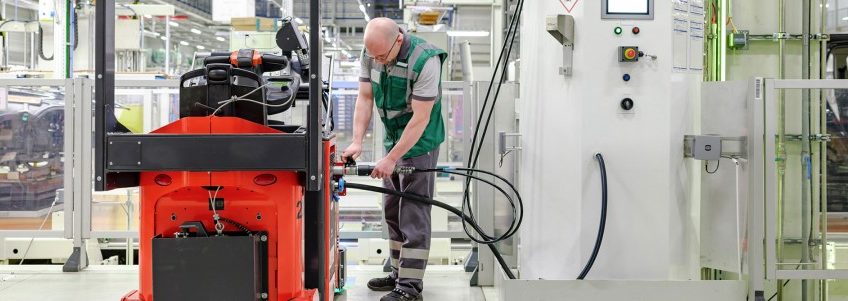Consortium with Fronius, Linde Material Handling, Günsel and the Technical University of Munich, is testing the economical use of this sustainable technology in everyday business operations, with the support of the Federal Ministry of Transport. „H2Ready” industry standard as a target of business and politics.
Leipzig, 4 December 2018 – The BMW Group plant in Leipzig has commissioned a further 70 hydrogen-powered tow trains (indoor tow tractors). These will be immediately deployed in production to supply the assembly lines with components from suppliers. The official handover took place today in the presence of all partners of a consortium consisting of the BMW Group, Fronius (manufacturer of fuel cell systems), Linde Material Handling (goods handling specialist and manufacturer of industrial trucks with fuel cell drives), Günsel Fördertechnik (Linde MH network partner, responsible for sales and service) and the Technical University of Munich (accompanying scientific research). The consortium is supported by the Federal Ministry of Transport and Digital Infrastructure and its programme management organisation, NOW GmbH. Already in 2013, BMW identified eleven hydrogen-powered tractors and forklifts in test operation during an initial research project in Leipzig, which defined important fields of action for the current follow-up project.
The objective of the consortium is to establish a future-oriented, sustainable and at the same time economically efficient drive technology in the field of indoor logistics and to position it on a broad basis. Together with its partners, the consortium is mapping the complete value chain for hydrogen fuel cell systems for indoor logistics. Specifically, the areas of focus will be on development, testing, everyday use, economic operation and the establishment of a hydrogen infrastructure. The collaborating partners are working on the identified challenges in various work packages. This includes an operator concept, the standardisation of interfaces, a plug & play solution for fleet conversion, the validation of service life and proof of economic efficiency in fleet operations. Further areas of concentration include service as well as the training concept for hydrogen fuel cell operations.
It is intended to establish an “H2Ready” industry standard as a result, which will open up the possibility for other manufacturers on a broad basis to use the innovative technology in new or converted vehicles in their own production facilities. The Federal Ministry’s funding aims to advance the technical development of climate-friendly hydrogen and fuel cell technology and thereby enhance its competitiveness.


